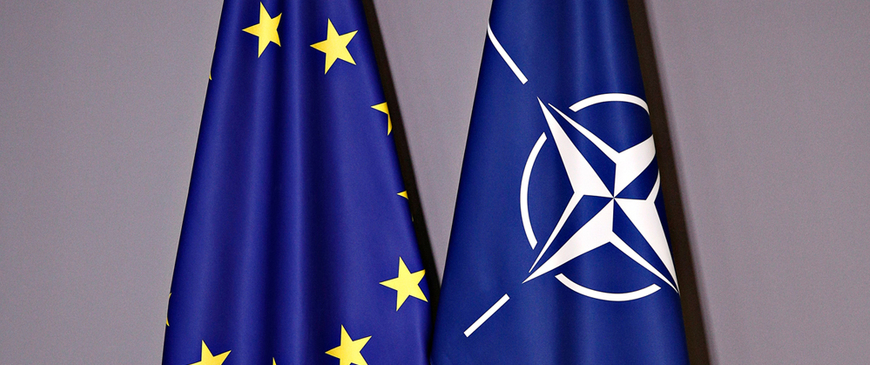
How to boost NATO-EU co-operation
Russia’s invasion of Ukraine has shown that Europe can no longer afford to treat quasi-theological arguments over EU and NATO primacy as more important than its own security. While the Alliance clearly remains indispensable to deterring Russia, the EU has a crucial complementary role to play.
LONDON – Russia’s invasion of Ukraine in February was a watershed moment for European security. But relations between NATO and the European Union remain marred by mutual suspicion, institutional rivalry, and a lack of effective cooperation. The two organizations must set aside their differences and work together.
Russia once again poses a long-term threat to European security. At the same time, the economic spillover from the war in Ukraine will intensify security challenges along Europe’s southern flank. And, as the current crisis involving Taiwan has shown, China’s increasing assertiveness will loom progressively larger in America’s strategic thinking.
The key European security challenge in the coming years will be to strengthen deterrence against Russia while retaining the ability to tackle other threats. When it comes to deterring Russia, NATO is clearly the indispensable organization, because there is no viable alternative to its integrated command structure. The Ukraine war has reinvigorated NATO’s core mission of standing up to Russia and defending its members’ territory if deterrence fails. Under new defense plans, NATO’s rapid response force will increase from 40,000 to 300,000 troops. And Finland and Sweden will soon become members.
NATO’s deterrent power is underpinned by the US forces stationed in Europe – which have increased by around 20,000 since Russia invaded Ukraine, to over 100,000 – and by America’s nuclear arsenal. But Europeans cannot expect the US to continue shouldering the bulk of their defense forever. Even before Donald Trump’s presidency, US complaints about unfair burden-sharing were growing louder and more frequent. America’s increased focus on Asia means that the US contribution to Europe’s defense is likely to shrink over time. And Europeans cannot rule out the possibility that Trump or someone in his isolationist “America First” mold will become president in 2025 and walk away from the US commitment to NATO.
So, Europeans have little choice but to contribute more to their own defense. Since the Ukraine conflict began, EU countries have announced an extra €200 billion ($203 billion) in military expenditure. But many countries could find implementing these commitments politically difficult given the economic downturn and competing budget demands.
Moreover, the impact of the additional defense expenditure depends on an overall plan for determining the weapons systems, logistics, and munitions needed. But European defense spending remains uncoordinated, with little intergovernmental cooperation. According to the European Defence Agency, joint research and development is currently only 6% of total EU defense R&D, and joint procurement accounts for just 11% of total equipment orders.
The EU has a key role to play in strengthening European security in a manner that complements NATO’s efforts. For starters, the Union needs to help member states manage the economic consequences of the war in Ukraine – thereby helping to sustain a political consensus for sanctions against Russia.
The EU can also help to prepare European armies better for conflict. The plan to establish a 5,000-strong rapid reaction force would push member states’ armed forces to cooperate more closely, contributing to their overall ability to deter threats. And the EU is better placed than NATO to confront security challenges such as disinformation and election interference, because it is through the Union that member states regulate the technology platforms through which misinformation spreads.
But the EU’s greatest potential contribution to European security lies in its ability to foster higher defense spending by member states. The EU’s fiscal rules can encourage this by excluding defense investment from budget deficit limits, in the same way that investment in the green and digital transformations has been excluded since the start of the pandemic. Moreover, the Union can devise incentives to promote joint procurement and deeper cooperation among national military forces.
Recent proposals from the European Commission, particularly a value-added tax exemption for joint defense procurement, could yield significant progress on defense spending, coordination, and efforts to strengthen European military capabilities. But European countries lack a truly collaborative mindset when it comes to developing, acquiring, and operating defense capabilities. Developing such an approach will require stronger political direction from national leaders.
The EU and other NATO members should ensure that their national defense markets are as open to one another as possible, to ensure economies of scale. The EU’s attempts to improve military capabilities should be guided by the principle of maximizing effectiveness and should not unnecessarily damage longstanding relationships between EU defense firms and their non-EU partners.
For its part, the US should continue to signal strong support for a greater EU role in European security and defense, particularly in developing the bloc’s military capabilities. At the same time, US policymakers can influence the elaboration of EU initiatives in ways that avoid duplication and strengthen European security.
Russian President Vladimir Putin’s war of aggression against Ukraine has shown that defending European values and interests is a matter of life and death. Europe can no longer afford to treat quasi-theological arguments over EU and NATO primacy as more important than its own security.
Ian Bond is director of foreign policy and Luigi Scazzieri is a senior research fellow at the Centre for European Reform.
